Jacob, Esau and Isaac
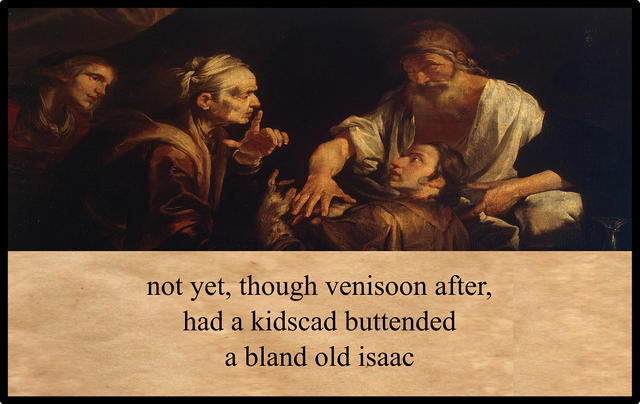
The fourth clause of paragraph two in James Joyce’s Finnegans Wake continues the blending of Biblical imagery and Irish history that we found in the previous clause. The first-draft version of this passage ran as follows:
Not yet had a kidson buttended an isaac (Hayman 46)
The second-draft, which expanded this only slightly, was almost identical to the final version:
Not yet though venisoon after had a kidscadet buttended a bland old isaac (Hayman 46)
When Finnegans Wake was first published in 1939, Joyce’s venisoon was printed as venissoon. The original spelling was restored by Danis Rose and John O’Hanlon in their edition of the novel, The Restored Finnegans Wake, which appeared in 2010.
Jacob and Esau and Isaac
The dominant image in this brief passage is the well-known story in the Book of Genesis in which Jacob tricks his father Isaac into giving him the blessing meant for the first-born son Esau. Earlier, in another popular passage, Jacob acquires his elder brother Esau’s birthright in exchange for a mess of potage:
And Isaac was forty years old when he took Rebekah to wife ... and Rebekah his wife conceived ... And when her days to be delivered were fulfilled, behold, there were twins in her womb. And the first came out red, all over like an hairy garment; and they called his name Esau. And after that came his brother out, and his hand took hold on Esau's heel; and his name was called Jacob ... And the boys grew: and Esau was a cunning hunter, a man of the field; and Jacob was a plain man, dwelling in tents. And Isaac loved Esau, because he did eat of his venison: but Rebekah loved Jacob. And Jacob sod pottage: and Esau came from the field, and he was faint: And Esau said to Jacob, Feed me, I pray thee, with that same red pottage; for I am faint: therefore was his name called Edom. And Jacob said, Sell me this day thy birthright. And Esau said, Behold, I am at the point to die: and what profit shall this birthright do to me? And Jacob said, Swear to me this day; and he sware unto him: and he sold his birthright unto Jacob. Then Jacob gave Esau bread and pottage of lentiles; and he did eat and drink, and rose up, and went his way: thus Esau despised his birthright. (Genesis 25:20–34)
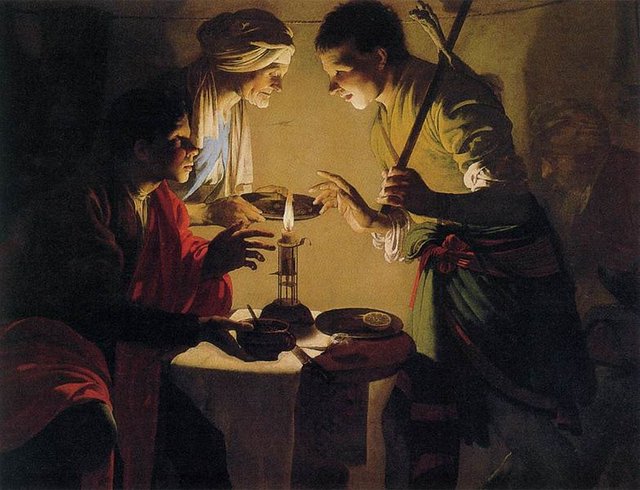
Two chapters later and Jacob is up to his old tricks again:
And it came to pass, that when Isaac was old, and his eyes were dim, so that he could not see, he called Esau his eldest son, and said unto him, My son: and he said unto him, Behold, here am I. And he said, Behold now, I am old, I know not the day of my death: Now therefore take, I pray thee, thy weapons, thy quiver and thy bow, and go out to the field, and take me some venison; And make me savoury meat, such as I love, and bring it to me, that I may eat; that my soul may bless thee before I die.
And Rebekah heard when Isaac spake to Esau his son. And Esau went to the field to hunt for venison, and to bring it. And Rebekah spake unto Jacob her son, saying, Behold, I heard thy father speak unto Esau thy brother, saying, Bring me venison, and make me savoury meat, that I may eat, and bless thee before the Lord before my death. Now therefore, my son, obey my voice according to that which I command thee. Go now to the flock, and fetch me from thence two good kids of the goats; and I will make them savoury meat for thy father, such as he loveth: And thou shalt bring it to thy father, that he may eat, and that he may bless thee before his death. And Jacob said to Rebekah his mother, Behold, Esau my brother is a hairy man, and I am a smooth man: My father peradventure will feel me, and I shall seem to him as a deceiver; and I shall bring a curse upon me, and not a blessing. And his mother said unto him, Upon me be thy curse, my son: only obey my voice, and go fetch me them. And he went, and fetched, and brought them to his mother: and his mother made savoury meat, such as his father loved. And Rebekah took goodly raiment of her eldest son Esau, which were with her in the house, and put them upon Jacob her younger son: And she put the skins of the kids of the goats upon his hands, and upon the smooth of his neck: And she gave the savoury meat and the bread, which she had prepared, into the hand of her son Jacob.
And he came unto his father, and said, My father: and he said, Here am I; who art thou, my son? And Jacob said unto his father, I am Esau thy first born; I have done according as thou badest me: arise, I pray thee, sit and eat of my venison, that thy soul may bless me. And Isaac said unto his son, How is it that thou hast found it so quickly, my son? And he said, Because the Lord thy God brought it to me. And Isaac said unto Jacob, Come near, I pray thee, that I may feel thee, my son, whether thou be my very son Esau or not. And Jacob went near unto Isaac his father; and he felt him, and said, The voice is Jacob’s voice, but the hands are the hands of Esau. And he discerned him not, because his hands were hairy, as his brother Esau’s hands: so he blessed him. And he said, Art thou my very son Esau? And he said, I am. And he said, Bring it near to me, and I will eat of my son’s venison, that my soul may bless thee. And he brought it near to him, and he did eat: and he brought him wine and he drank. And his father Isaac said unto him, Come near now, and kiss me, my son. And he came near, and kissed him: and he smelled the smell of his raiment, and blessed him, and said, See, the smell of my son is as the smell of a field which the Lord hath blessed: Therefore God give thee of the dew of heaven, and the fatness of the earth, and plenty of corn and wine: Let people serve thee, and nations bow down to thee: be lord over thy brethren, and let thy mother's sons bow down to thee: cursed be every one that curseth thee, and blessed be he that blesseth thee.
(Genesis 27:1–29)
Joyce himself glossed this passage in a letter to his patron Harriet Shaw Weaver:
The venison purveyor Jacob got the blessing meant for Esau (The Letters of James Joyce 15 November 1926)
Isaac is blind. Joyce was going blind when he was writing Finnegans Wake, and was constantly eyesick.
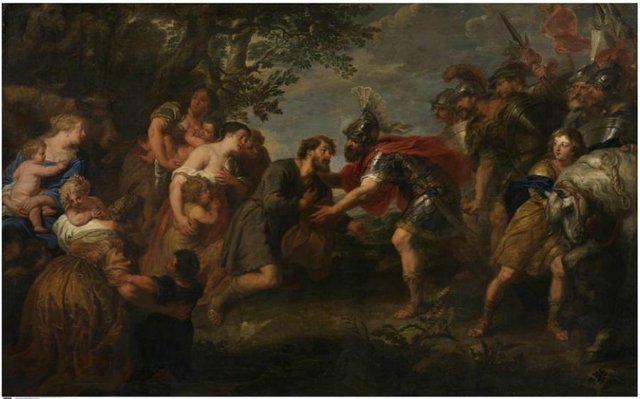
Shem and Shaun
In Finnegans Wake the twin sons of HCE and ALP, Shem and Shaun, are the quintessential rivals, locked in perpetual conflict. But their ultimate desire is to be reconciled with one another—as Jacob and Esau eventually are. Shem, who is identified here with Jacob, is the younger son biologically, but he has displaced his elder brother. This reflects Joyce’s own position in his family: James Joyce was actually the second-born son of John Stanislaus Joyce and Mary Jane Murray, but his would-be elder brother, John Augustine, died shortly after birth, leaving Joyce to inherit his birthright (Ellmann 21). Thus Shem (from Séamas) is essentially a portrait of James, while Shaun (from Seán) can be seen as a conflation of James’s two closest brothers, both of whom were called John: the elder John Augustine and the younger John Stanislaus. This explains why so many seasoned Wakean scholars regard Shem as the elder brother, even though Joyce explicitly identifies him with Jacob:
Shem is as short for Shemus as Jem is joky for Jacob. (RFW 134:01)
It is possible that Joyce is also referring to this unique familial situation in the opening pages of A Portrait of the Artist As a Young Man, where Stephen Dedalus is called baby tuckoo. I believe this is intended to be a hypocorism for cuckoo, the archetypal usurper of the avian kingdom.
Note also how Jacob’s epithet kidscad was emended from kidscadet. A cadet is a younger brother, or kid brother. Later in this opening chapter, Shem and Shaun are referred to as Caddy and Primas (RFW 011.33), which again makes Shem the younger and Shaun the first-born (primus). Shem is also a cad, of course.
As I pointed out in a previous article, Shem and Shaun are associated with the bedroom door. This, the fourth of seven clauses in this paragraph, corresponds to the phrase swerve of shore in the first paragraph. It is the fourth of seven stations on our second circuit of the master bedroom.
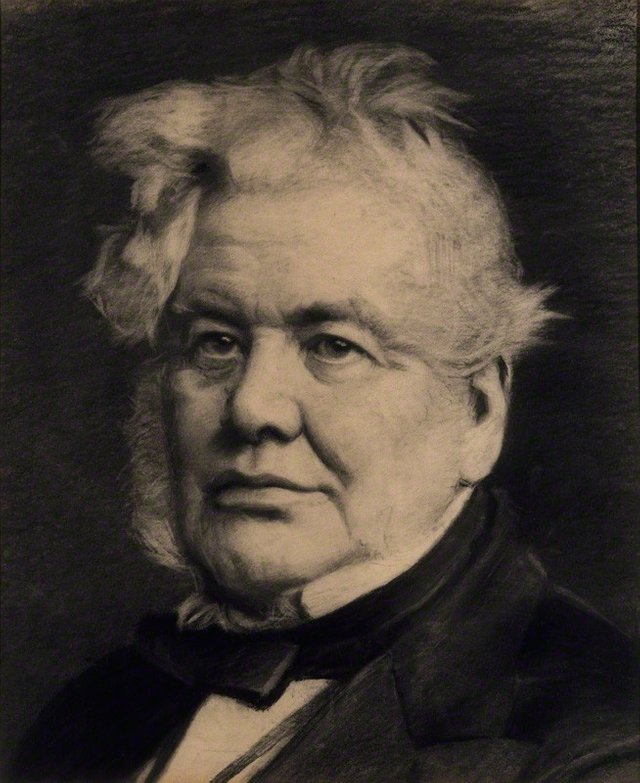
Parnell and Butt
This clause also refers to an important incident in Irish political history. Isaac Butt was a lawyer who entered politics to work for the peaceful introduction of home rule to Ireland. He led an Irish Home Rule Party in the wake of the General Election of 1874, in which sixty members of his Home Rule League were elected to the British Parliament.
Over the following two years, Butt’s party acted largely in concert with the Liberal Party, who were in opposition, and little progress was achieved on the home rule front. Meanwhile, Charles Stewart Parnell, an ambitious young man from a family of wealthy Protestant landowners in County Wicklow, had joined the Home Rule League. In 1875 he was elected to Parliament for County Meath in a by-election. It was not long before he had attracted the attention of the more radical wing of the Irish Party—not to mention the paramilitary Irish Republican Brotherhood.
Butt’s policies and practices were too bland—there’s that word again—for Parnell. He favoured the use of obstructionism and filibusterism—the tactic of forcing Parliament to address Irish issues by making the normal day-to-day procedures of the House impossible. Butt preferred a softly softly approach and was opposed to any policy that might antagonize the members of the House. Things came to a head in July 1877 when Butt threatened to resign if the practice of obstructionism was not abandoned. The following month Parnell was elected President of the Home Rule Confederation of Great Britain in place of Butt.
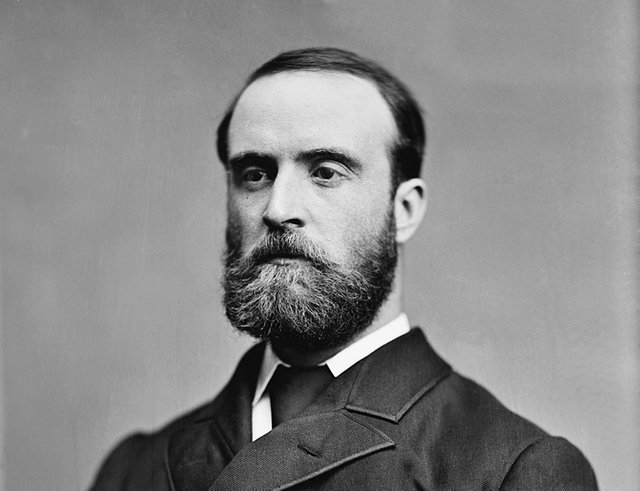
Joyce’s take on this episode of Irish history was succinct:
Parnell ousted Isaac Butt from leadership (The Letters of James Joyce 15 November 1926)
This is not entirely accurate. Isaac Butt remained the leader of the Home Rule Party until his death in 1879. He was then replaced by William Shaw. The following year, after the General Election of 1880, Shaw was replaced as chairman by Parnell, who then proceeded to refashion the party as the Irish Parliamentary Party. The episode Joyce is referring to occurred on 31 August 1877, when Parnell replaced Butt as the President of the Home Rule Confederation of Great Britain.
To borrow a term from the historian F S L Lyons, Irish politics is, and always has been, notoriously fissiparous. Making sense of the bedlam of political bodies with which Parnell was associated is not a trivial task:
- Home Government Association
- Irish Home Rule League
- Home Rule Confederation
- Home Rule Party
- Home Rule Confederation of Great Britain
- Irish National Land League
- Irish National League
- Irish Parliamentary Party
Some of these terms are used interchangeably to refer to the same body : some are used proleptically : some postleptically.
Joyce’s term buttended does not only refer to Isaac Butt. As a child, Parnell was nicknamed Butthead on account of his habit of resolving disputes by charging head first against his antagonist (Glasheen 16). And in the Biblical story, Isaac is the butt of Jacob and Rebekah’s ruse.
References
- Richard Ellmann, James Joyce, Oxford University Press, Oxford (1959, 1982)
- Adaline Glasheen, Butthead, A Wake Newslitter: Studies in James Joyce's Finnegans Wake, n.s. 13, i (February 1976): 16
- David Hayman, A First-Draft Version of Finnegans Wake, University of Texas Press, Austin TX (1963)
- James Joyce, A Portrait of the Artist as a Young Man, B W Huebsch, Inc, New York (1921)
- James Joyce, Finnegans Wake, The Viking Press, New York (1958, 1966)
- Danis Rose, John O’Hanlon, The Restored Finnegans Wake, Penguin Classics, London (2012)
- James Joyce et al, The Letters of James Joyce, Volumes I, II, III, Stuart Gilbert (editor), Richard Ellmann (editor), Viking Press, New York (1966)
Image Credits
- Isaac Blesses Jacob: Wikimedia Commons, Gioacchino Assereto (artist), Hermitage Museum, Public Domain
- Esau Selling His Birthright: Wikimedia Commons, Hendrick ter Brugghen (artist), Public Domain
- Jacob and Esau Are Reconciled: Wikimedia Commons, Jan van den Hoecke (artist), Public Domain
- Isaac Butt: Wikimedia Commons, John Butler Yeats (artist), Public Domain
- Charles Stewart Parnell: Wikimedia Commons, Brady-Handy Photographic Collection, Library of Congress, Public Domain
Useful Resources
- FWEET
- The James Joyce Scholars’ Collection
- FinnegansWiki
- Annotated Finnegans Wake (with Wakepedia)
- James Joyce’s Family Tree

Good job again:) upvote for You
dear @harlotscurse your very well post..
& great english..
i really love your post..
thanks for sharing..
Good post. Your effort is excellent.
sir write it pretty much.
Excellent argument that you gave us to know about the story. regards
You have a talent in making publications quite entertaining.
dear @harlotscurse this is really awsome post brother i like it and #resteem your post
omg...what a beautiful history dear friend @harlotscurse , thank you for sharing with us this history, keep it up D:) @harlotscurse this's good work
It's really good the way you are giving a good history to the world,,,,I love your post,,, thank you my dear friend for sharing with #Us,,,,,,, and very good job,,,keep it #Up,,,
Dear @harlotscurse Very special publication Thank you for the valuable participation I liked this....?
wonderful history my dear friend @harlotscurse
i love your post all time, it's really
thank you for sharing this post